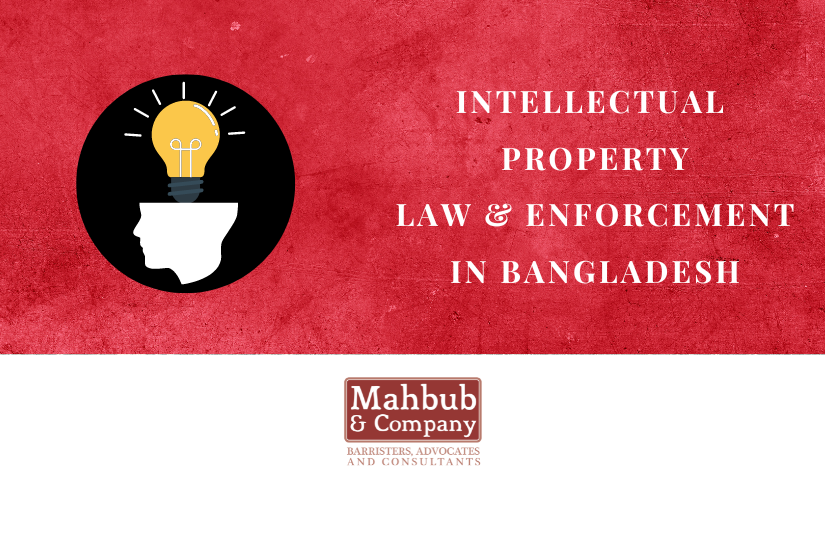
Introduction
Today, Bangladesh stands as one of the fastest-growing economies in South-East Asia. As a requisite for such an evolving ecosystem, the presence of a robust Intellectual Property laws framework cannot be overstated. The history of Intellectual Property Law in Bangladesh can be traced back to the time of British colonial rule, during which some of Britain’s laws were introduced in India (which included Bangladesh at the time). Since then, the IP regime in the country has undergone significant, much-needed upgrades. Nevertheless, in current times, where rapid development in technology has fast-tracked all other sectors of industry and commerce, there is a growing need to make revisions in frameworks that are decades-old to suit the dimensions of new sector-specific requirements.
This article aims at examining the existing IP laws and their enforcement in Bangladesh vis-à-vis analysing current challenges and mapping a way forward.
Intellectual Property Laws- The Framework in Bangladesh
In a move to consolidate the laws and execution strategy regarding the IP laws of the jurisdiction, the Department of Patents, Designs and Trademarks (also known as DPDT) was formed under the Ministry of Industries in 2003. In consequence, the DPDT merged Patent Office and the Trademark Registry Office, which previously operated as two separate offices.
Trademark Laws
A trademark is an easily recognisable sign, symbol, design, word or phrase that represents a company or product. Currently, Bangladesh’s trademark law framework involves two major statutes- Bangladesh’s Trademark Act, 2009 and Trademark Rules 2015. On the basis of the regulations, guidelines and restrictions outlined in these laws, anyone may apply for a trademark in Bangladesh through the DPDT.
What are the requirements for filing a trademark in Bangladesh?
If you are a business looking to register your trademark in Bangladesh, the following information must be included in the trademark application:
- Specifics of the mark/logo/device prints or representations
- Name of the applicant, address and nationality
- If the applicant is a firm, the signatory’s name and designation in the firm also have to be provided in addition to the other information
- Status of the applicant i.e. manufacturers/merchandisers/ service providers
- Specification of goods/ service/class
- Trademark date of a user (whether the mark is in use or proposed to be used in Bangladesh)
- Power of Attorney authorizing to the applicant’s lawyer if the same is required
Why Is Registering A Trademark Important For Your Business?
A registered trademark may prove to be valuable asset for your company / Business. These assets keep on appreciating over time. As your business grows over time, the value of the trademarks gets scaled up automatically. In addition to this, a registered trademark establishes ownership over the brand name or logo. It protects your brand from any unauthorized use by a third party. The registered trademark proves that the product is your property and that you have exclusive rights to use, sell, and modify the brand or goods in whichever manner you want.
Copyright Laws
The latest legislation in way of copyright laws has come in the form of the Copyright Act of 2000. The Act of 2000 has been a massive step towards enforcing the TRIPS Agreement in the nationwide jurisdiction. The 2000 Act also created a governmental obligation to establish a Copyright Office and a 6-member Copyright Board headed by a person qualified to be the judge of the High Court division.
Patent Laws
The laws relating to patents and designs in Bangladesh have been consolidated in a single enactment in Bangladesh, namely, the Patents and Designs Act, 1911. Since the enactment of the Patents and Designs Act, 1911, the concepts of patents and designs have been subjected to enormous development through judicial decisions and precedents across the globe. In addition, a large number of international conventions have been adopted recommending the enactment of uniform laws on intellectual property including patents and designs.
Bangladesh, enacted in November 2013, the national GI legislation known as Geographical Indication Products (Registration and Protection) Act 2013. Despite the enactment of the statute, the provisions are yet to be implemented in a comprehensive manner that, given the country’s rich resources, can secure Bangladesh’s interests in domestic jurisdictions as well as abroad.
Bangladesh’s Participation On The International IP World-Stage
Besides the national laws which are in operation, Bangladesh is a member of several International treaties. It is a member of the Universal Copyright Convention (UCC) since 1975; of the World Intellectual Property Organization (WIPO) since 1985; of TRIPS Agreement since 15th April 1994; of Berne Convention since 1999; of Paris Convention since 1991.
The TRIPS Agreement, which is the foremost authority on Intellectual Property in international law, has played a major role in shaping Bangladesh’s IP law regime.
Authorities understand and acknowledge that in the absence of an effective mechanism that protects business interests, there is likely to be an adverse effect on the entire commercial sector as there would be little or no incentive for pursuing new ideas, designs, etc. In addition to damages and fines, measures may also be taken to increase criminal penalties for intellectual property offences such as counterfeiting and passing off. Since Intellectual Property is a rather niche subject, it mandates the undertaking of special efforts by the government and the concerned subsidiary organisations to spread awareness of its effectiveness.
Written and compiled by the Corporate and M&A team at Mahbub & Company



